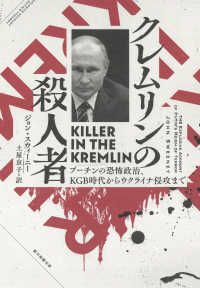- ホーム
- > 洋書
- > 英文書
- > Politics / International Relations
基本説明
Shows how Fichte reformulated Rousseau's constitutional politics and radicalized the economic implications of Kant's social contract theory with his defense of the right to work.
Full Description
This book presents an important new account of Johann Gottlieb Fichte's Closed Commercial State, a major early nineteenth-century development of Rousseau and Kant's political thought. Isaac Nakhimovsky shows how Fichte reformulated Rousseau's constitutional politics and radicalized the economic implications of Kant's social contract theory with his defense of the right to work. Nakhimovsky argues that Fichte's sequel to Rousseau and Kant's writings on perpetual peace represents a pivotal moment in the intellectual history of the pacification of the West. Fichte claimed that Europe could not transform itself into a peaceful federation of constitutional republics unless economic life could be disentangled from the competitive dynamics of relations between states, and he asserted that this disentanglement required transitioning to a planned and largely self-sufficient national economy, made possible by a radical monetary policy. Fichte's ideas have resurfaced with nearly every crisis of globalization from the Napoleonic wars to the present, and his book remains a uniquely systematic and complete discussion of what John Maynard Keynes later termed "national self-sufficiency."
Fichte's provocative contribution to the social contract tradition reminds us, Nakhimovsky concludes, that the combination of a liberal theory of the state with an open economy and international system is a much more contingent and precarious outcome than many recent theorists have tended to assume.
Contents
Acknowledgments ix Introduction 1 Chapter 1: Perpetual Peace and Fichte's Theory of the State 15 Herder's Letter 15 Perpetual Peace and Power Politics 17 The Citizen of Frejus and the Philosopher of Konigsberg 22 The Citizen of Frejus, the Philosopher of Konigsberg, and the Professor at Jena 35 Toward The Closed Commercial State 61 Chapter 2: Commerce and the European Commonwealth in 1800 63 Gentz's Review 63 Perpetual Peace and The Closed Commercial State 65 Fichte's History of Commerce 74 Prussia and the Anglo-French Debate of 1800 84 Fichte's Contribution to the Debate 98 Chapter 3: R epublicanization in Theory and Practice 103 Fichte's Proposal 103 Fichte's Implementation Strategy 106 The Closed Commercial State and the Political Economy of Prussian Reform 115 Fichte's Moral Challenge Continued 126 Chapter 4: Fichte's Political Economy of the General Will 130 Hestermann's Review 130 Open Commercial State versus Closed Commercial State 134 Needs and Rights in Fichte's Theory of Property 143 The Transcendental Industrialism of The Closed Commercial State 157 Conclusion 166 Bibliography 177 Index 195








